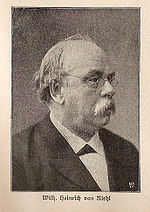Wilhelm Heinrich Riehl, Date of Birth, Place of Birth, Date of Death
TweetWilhelm Heinrich Riehl
writer, Philosopher of Volkish thoughtAbout Wilhelm Heinrich Riehl
- Wilhelm Heinrich Riehl (6 May 1823 – 16 November 1897) was a German journalist, novelist and folklorist. Riehl was born in Biebrich in the Duchy of Nassau and died in Munich.
- Riehl was born into a settled middle-class background, was a professor at the University of Munich, and later in life a curator of Bavarian antiquities.According to George Mosse, "Riehl's writings became normative for a large body of Volkish thought...he constructed a more completely integrated Volkish view of man and society as they related to nature, history, and landscape....in his famous Land und Leute (Land and People), written in 1857-63," which "discussed the organic nature of a Volk which he claimed could only be attained if it fused with the native landscape....Riehl rejected all artificiality and defined modernity as a nature contrived by man and thus devoid of that genuineness to which living nature alone gives meaning...Riehl pointed to the newly developing urban centers as the cause of social unrest and the democratic upsurge of 1848 in Hessia"....for many "subsequent Volkish thinkers, only nature was genuine.""Riehl desired a hierarchical society that patterned after the medieval estates.
- In Die bürgerliche Gesellschaft (Bourgeois Society) he accused those of Capitalist interest of "disturbing ancient customs and thus destroying the historicity of the Volk."Riehl argued that the 'working class' were the most respectable Volk, since they were best attuned to nature itself.
- Throughout his work, Riehl displays a strong conviction that the German people and land are intrinsically connected to one another.
- He also is considered the founder of the "German ethnographic Volkskunde" and drew many of his conclusions in his work from his personal experiences hiking throughout Germany.
Read more at Wikipedia
See Also
- Famous People's Birthdays on 06 May, Germany
- Famous People's Birthdays in May, Germany
- Famous writer's Birthdays on 06 May, Germany
- Famous writer's Birthdays in May, Germany
- Famous historian's Birthdays on 06 May, Germany
- Famous historian's Birthdays in May, Germany
- Famous university teacher's Birthdays on 06 May, Germany
- Famous university teacher's Birthdays in May, Germany
- Famous journalist's Birthdays on 06 May, Germany
- Famous journalist's Birthdays in May, Germany
- Famous sociologist's Birthdays on 06 May, Germany
- Famous sociologist's Birthdays in May, Germany


 Date of Birth:
Date of Birth:  Place of Birth: Biebrich, Hesse, Germany
Place of Birth: Biebrich, Hesse, Germany